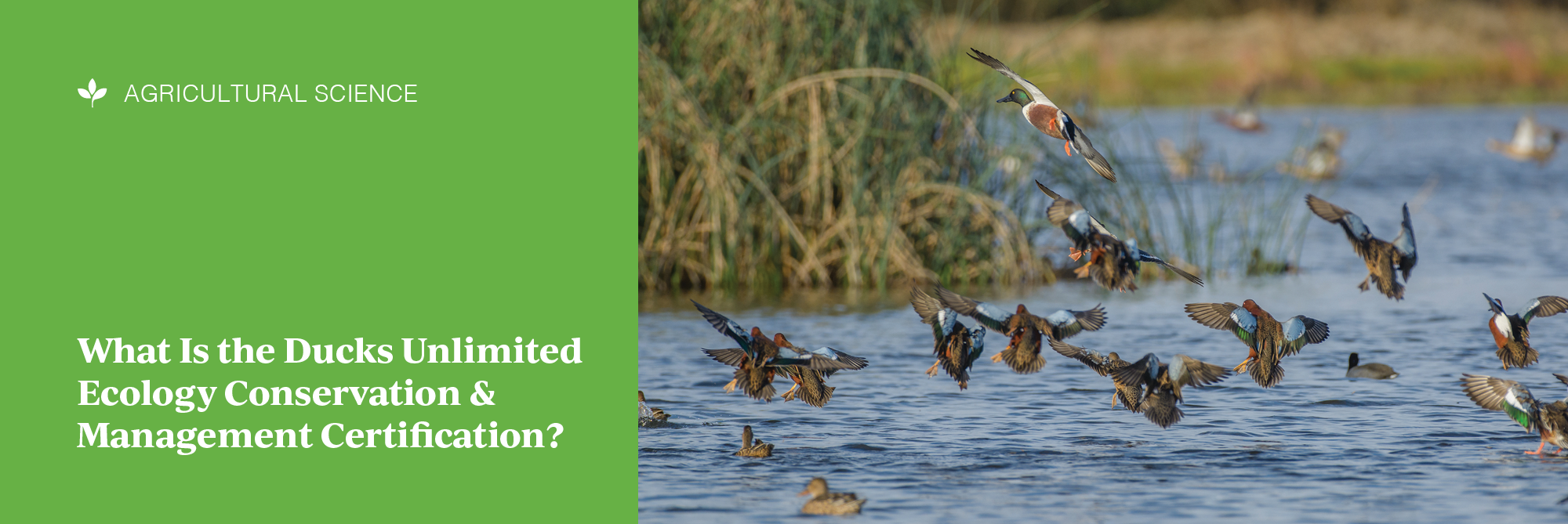What Is the Ducks Unlimited Ecology Conservation & Management Certification?
After serving as a Texas FFA state officer in 2018, Josh Witherspoon joined the iCEV team as a part-time employee for 3 years before taking on the role of content development specialist in 2022. Witherspoon holds a bachelor's degree in agricultural communications from Texas Tech University, in which his experience and proficiency in writing, marketing and CTE allow him to effectively communicate the successes of CTE educators and students and the value iCEV has to offer.
If you’re a high school agriculture or environmental science educator interested in implementing the Ducks Unlimited Ecology Conservation & Management certification, it’s important that you have all of the information and tools to set your students up for success. However, it can be challenging when you’re not entirely sure what will be on the certification exam or how to best prepare your students for it.
As a host of industry certifications and certification prep provider, educators often ask us what students need to be successful on this certification exam.
In this article, we’ll explore three of the most common questions educators ask about the Ducks Unlimited Ecology Conservation & Management Certification, including:
- What is the Ducks Unlimited Ecology Conservation & Management Certification?
- How is this certification exam structured?
- How do I prepare my students for the Ducks Unlimited Ecology Conservation & Management certification?
By better understanding the purpose and components of this exam, you’ll be able to more effectively prepare students to earn their certifications.
1. What Is the Ducks Unlimited Ecology Conservation & Management Certification?
The Ducks Unlimited Ecology Conservation & Management Certification verifies individuals’ knowledge and skills in the areas of ecological principles, wildlife management, as well as habitat, forest, grasslands, wetlands and waterfowl conservation and management.
Ducks Unlimited created this certification because of their knowledge and passion for wetland and waterfowl conservation. They take great responsibility in sharing with future industry professionals in hopes of creating a more ecologically minded world.
This certification is designed for students in grades 9-12 and can be used to upskill individuals already in the workforce. Those who earn the certification are more qualified and prepared to enter highly-specialized roles within the industry.
Careers may include wildlife habitat manager, wildlife population manager, wildlife research ecologist, wildlife law enforcement officer and others, particularly now that society has begun to place a greater value on natural resources and the environment.
2. How Is This Certification Exam Structured?
The certification exam consists of 100 questions and assesses knowledge and skills from the following weighted industry standards:
Ecological Principles - (20%)- Ecological Systems
- Ecological Succession
- Monitoring & Sustaining Ecosystems
- North American Model of Wildlife Conservation
- Population Ecology
- Management Plans
- Non-Game Animals
- Predators & Furbearers
- Game & Upland Birds
- Waterfowl
- Types of Habitats
- History of Conservation
- Benefits, Threats, Legislation & Conservation Management of Forests, Grasslands and Wetlands
By understanding what standards candidates will be tested on, you’ll be better able to prepare your learners effectively. In addition, since each industry standard is weighted, it’s a good idea to spend additional time on standards with a higher percentage of questions on the exam.
For the full breakdown of skills and knowledge, students will learn, view the study guide.
Standard 1. Ecological Principles - 20 Questions
The first industry standard, Ecological Principles, focuses on the basic components of ecosystems, ecological succession and management. Earners will be expected to define components of ecology, ecosystems, vertical stratification, types of ecosystems, the energy flow within an ecological system as well as food webs.
Understanding ecological principles and the complexities of ecosystem management equips individuals with the foundational knowledge necessary to learn more advanced skills tested for in the certification exam.
Standard 2. Wildlife Conservation & Management - 30 Questions
The next industry standard tested for is Wildlife Conservation and Management, which includes studying the basics of wildlife population ecology and the characteristics of wildlife populations. In addition, certification candidates will be expected to be able to demonstrate the processes and concepts related to wildlife management.
As a result of mastering this industry standard, candidates will have a solid understanding of the benefits and techniques used in wildlife management.
Standard 3. Species Identification - 10 Questions
The Species Identification industry standard includes identifying factors and characteristics of various mammal, amphibian, reptile and bird species which can be categorized into game and non-game animals. This standard challenges certification candidates to use the physical attributes of a variety of wildlife to identify their taxonomic categorization.
While this industry standard holds less weight than the rest, it’s still important to spend time practicing species identification, since understanding the individuals within ecosystems is an important skill in the environmental science industry.
Standard 4. Habitat Conservation & Management - 40 Questions
The final industry standard examines understanding of Habitat Conservation and Management. This standard includes the history of conservation, past and present legislation as well as current conservation efforts.
Certification candidates who master this industry standard will understand and be able to define the importance of managing land, wildlife and resources.
3. How Do I Prepare My Students for the Ducks Unlimited Ecology Conservation & Management Certification?
The best way to prepare your students to be successful on the Ducks Unlimited Ecology Conservation & Management certification is to expose them to the knowledge and skills tested for in the certification exam. But to do that, you need the right preparation materials to support their efforts.
iCEV offers a Ducks Unlimited Ecology Conservation & Management certification prep curriculum designed to help students master industry standards and develop their skills in ecology and conservation management. This comprehensive course curriculum includes pre-built lesson plans, multimedia videos, practice exams and everything you need to help your students find success and earn their certification.
Does this certification sound like the right fit for your students and classroom? Explore the Ducks Unlimited Ecology Conservation & Management Certification as well as preparation content to set your certification candidates up for success.


